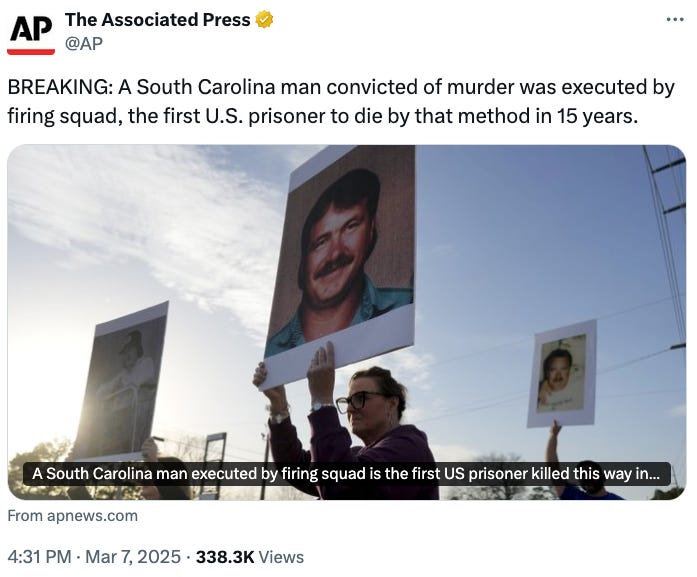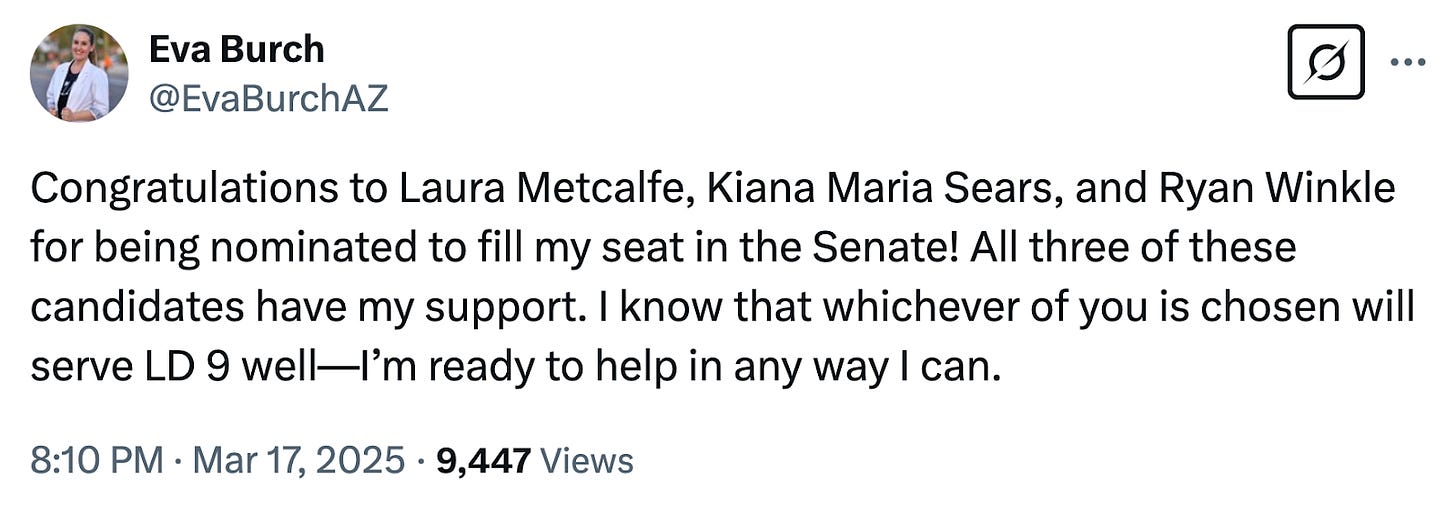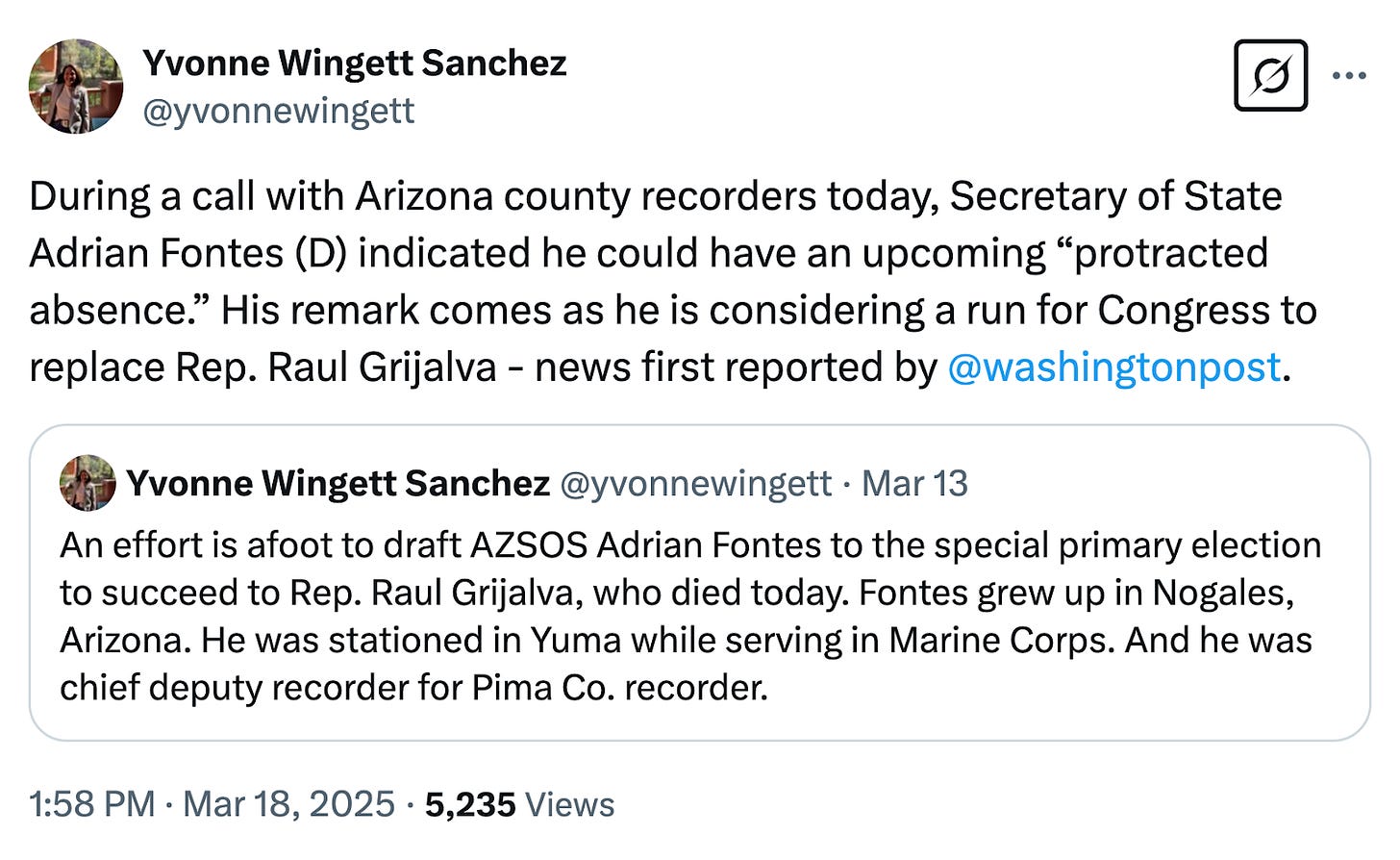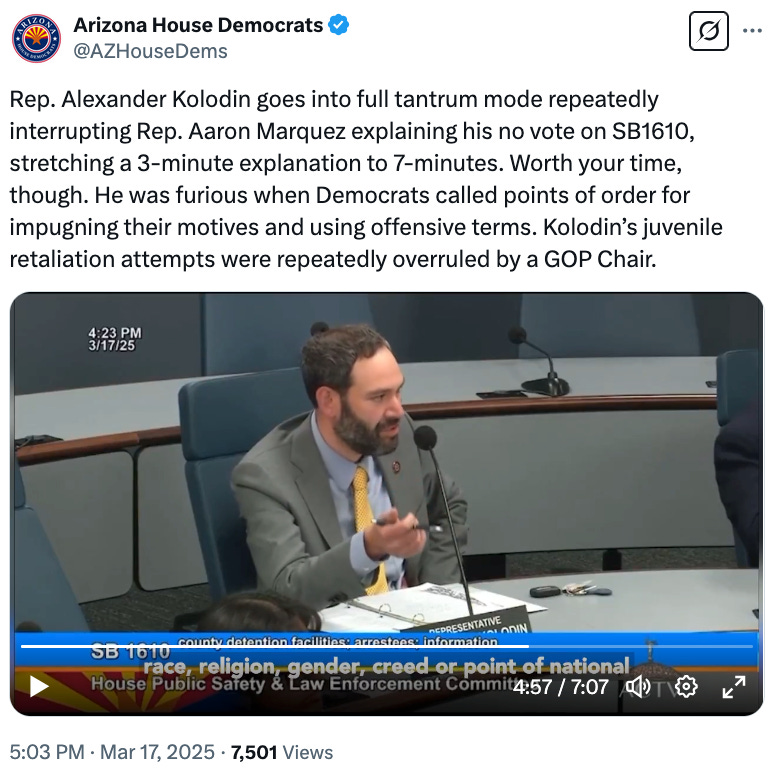
Burgeoning ballot referrals
If at first you don’t succeed, ask the voters … We’ve never met a woke general … And overruled – repeatedly.
Arizona’s Republican lawmakers want to execute death row inmates by a firing squad, eliminate taxes on cryptocurrency and implement a statewide DEI ban.
Democratic Gov. Katie Hobbs won’t be able to stop them.
Last year, most counties issued two-sheet ballots overflowing with referrals from Republican lawmakers — ideas they knew Hobbs wouldn’t approve.
This year, Republicans are advancing nearly 30 ballot measures for voters to decide in the 2026 election. And as long as a Democrat holds the state’s executive office, those ballot referrals will keep coming and piling up.
Sometimes, it works out in the lawmakers’ favor. Voters passed four legislative referrals last year to pay families of first responders killed on duty, let property owners sue to get tax refunds over public nuisance crimes, require life sentences for those convicted of child sex trafficking and allow local police to arrest people in the country illegally.
The ballot referrals usually reflect the issues Republicans value the most. Ballot space is precious, and the campaign to inform voters can get costly. But if lawmakers really want their bill to become law without the governor’s approval, the only avenue is a ballot referral.
That seems to be a worthwhile gamble for Republicans who, so far this year, have pushed voter referrals ranging from truncating term limits for the State Mine Inspector to legalizing semiautomatic weapons.
Elections
Before the legislative session started, Republican leadership began pushing a plan to speed up election results by getting rid of voters’ ability to drop off their early ballots on Election Day. That was the first (and so far, only) bill Hobbs vetoed this year.
Now, Republicans are banking on Rep. Alexander Kolodin’s HCR2013 which asks voters to cut off early ballot drop-offs on the Friday before Election Day. The ballot referral also prohibits foreign money in election administration.
Meanwhile, Republican Rep. Rachel Keshel’s HCR2002 would ask voters to eliminate voting centers where they can cast their ballots at any location. Instead, voters would only be allowed to vote at their neighborhood polling place.
Culture wars
After successfully making it a state crime to be an undocumented immigrant, Republicans now want to ask voters to conduct a census every 10 years counting only legal citizens. Republican Sen. Jake Hoffman’s SCR1022 would cost $5 million a year and make the independent redistricting commission draw new legislative districts based on the immigrant-less count, assuming voters approve it.
House Speaker Steve Montenegro’s HCR2055 would ask voters to declare drug cartels terrorist organizations and make the Arizona Department of Homeland Security do “everything within its authority to address the threat posed by drug cartels.” It strategically says people who are here illegally can’t use the measure to support an asylum claim. Donald Trump issued an executive order declaring drug cartels as foreign terrorist organizations in January.
Montenegro is also taking a note from the Trump administration by asking voters to implement a statewide DEI ban through HCR2042. That voter referral would prohibit hiring using “preferential treatment” based on race or ethnicity.
Kolodin, meanwhile, wants voters to decide whether death row inmates should be killed by firing squad instead of lethal injection. He cited recent botched lethal injections in his support of HCR2024, and said death by gunfire is more humane.
The Freedom Caucus Republican also wants Arizonans to be legally allowed to possess silencers, automatic firearms and short-barreled rifles. They’re trying to ask voters to approve that through HCR2037.
Meta legislation
A few of the ballot referrals lawmakers are advancing this year would directly affect them.
Republican Rep. Lisa Fink’s HCR2015 would ask voters to give lawmakers control of federal funds like grants and general revenue-sharing money. The Governor’s Office currently controls federal funding that’s not designated to a specific entity like a city or town, such as the pandemic-era American Rescue Plan dollars.
Lawmakers also think it’s time for a pay raise, even though voters have consistently told them no. Republican Sen. John Kavanagh wants voters to boost legislators’ pay from $24,000 to $48,000 through SCR1003. The last time voters approved a legislative pay raise was in 1998. They’ve shot down six attempts to raise lawmakers' pay in the 27 years since. But Kavanagh’s ballot referral would negate the need to keep asking voters — it would automatically increase lawmakers’ pay to keep up with inflation going forward.
Republican Rep. Quang Nguyen’s bipartisan HCR2053 would remove lawmakers’ immunity from receiving speeding tickets — and something tells us that if voters get the chance, they’ll approve it. Both Sen. Mark Finchem and former Sen. Justine Wadsack recently tried to claim legislative immunity to get out of traffic tickets, and Hoffman recently avoided a speeding ticket when a cop took it upon himself to grant the lawmaker immunity.
But lawmakers wouldn’t have to worry about speeding or red light traffic cameras if voters back Sen. Wendy Rogers’ SCR1002. The measure asks voters to ban using photo enforcement systems to issue tickets for speeding or running a red light.
Taxes
Rogers combined two of her favorite things — lower taxes and cryptocurrency — to concoct SCR1001. The referral would ask voters to exempt virtual currency from property taxation.
Kolodin also wants property tax exemptions, but for combat veterans with a service-related disability through HCR2023. Plus, he wants voters to let the Legislature get rid of any agency rule that costs taxpayers more than $1 million a year. HCR2038 is a simplified version of Prop 315, which failed on last year’s ballot. It would have prevented a rule from taking place if it cost more than $500,000 over five years, and Kolodin thinks voters will support the measure if it’s phrased more clearly.
Lawmakers also want to limit cities, towns and counties from collecting taxes.
Rep. Jeff Weninger and Hoffman are running mirror bills to ask voters to bar the collection of taxes based on vehicle miles traveled. It’s a move to preemptively ban any future plans to supplement the gas tax with the rising use of electric cars. Last year, then-Sen. Ken Bennett joined Democrats to kill the measure.
Senate President Warren Petersen is championing SCR1008, a voter referral to require a two-thirds vote from city councils and county boards to raise local taxes. And Rep. Leo Biasiucci’s HCR2021 has some Democratic support to let voters limit city sales taxes on groceries to 2%.
No woke generals?: The head of the Arizona National Guard is stepping down, which sets up another battle with a Senate panel designed to thwart Democratic Gov. Katie Hobbs’ nominees, Capitol Media Services’ Howard Fischer reports. Adjutant General Kerry Muehlenbeck was one of the few appointees from former Gov. Doug Ducey that Hobbs kept on, and she’s the first to go voluntarily and without scandal, Fischer notes.
“Woke ideology of the politicization of our men and women will be an automatic death knell for any Hobbs nominee for this important post,” Republican Sen. Jake Hoffman, who leads the Senate committee on executive appointments, warned.
Negotiating through the press is still negotiating: Republican lawmakers are creating a new “Ad Hoc Committee on Executive Budget Mismanagement” as they continue blasting Hobbs’ budget management skills. The Republic’s Stacey Barchenger explains the details of their latest fight over the Department of Child Safety’s congregate care funding from Tuesday’s press conference. Yesterday, the Governor’s Office shot back with a pair of press releases saying Republicans have “gone to the press to lie about the Governor’s budget, refused to enter negotiations, and are holding kids in foster care and Arizonans with disabilities hostage to their political games.”
Walls incoming: Department of Homeland Security Secretary Kristi Noem announced on Twitter that President Donald Trump plans to build seven more miles of border wall in Arizona. And while a Customs and Border Protection official told the Republic’s Raphael Romero Ruiz that no additional border wall construction had been confirmed in Arizona as of Monday, Trump did award the first border wall contract of his second term for a project in Texas. Meanwhile, Republican U.S. Rep. Juan Ciscomani sponsored legislation to let CBP build more roads and temporary structures on federal lands near the border, Arizona Public Media’s Katya Mendoza reports.
Step right up: The list of third-tier candidates vying to take the seat of Congressman Raúl Grijalva is growing, but no big-name Democrats have been officially announced yet. As of Tuesday night, 13 candidates had filed statements of interest to run in Southern Arizona’s Congressional District 7, but not Adelita Grijalva or Adrian Fontes, though the rumor mill has both filing soon. Meanwhile, we’re already seeing polling in the Democratic primary to challenge Republican U.S. Rep. David Schweikert in CD1. Democrat Amish Shah, the 2024 nominee, is way ahead of Marlene Galán Woods, the third-place finisher in the crowded 2024 Democratic primary, per Shah’s own polling. As the Republic’s Laura Gersony recently noted, the 2026 Democratic primary in Schweikert’s district is looking like another crowded race.
Secret executions are the worst executions: As Arizona prepares for its first execution under Hobbs today, national publications are zeroing in on the process, with the Washington Post profiling David Duncan who Hobbs hired to review Arizona’s death penalty process, then fired when she didn’t like his recommendations. And Bolts Magazine digs into the secrecy surrounding executions in Arizona and elsewhere and the political dynamics of executions.
“It is no coincidence that the state terminated its independent review within days after the election of Donald Trump,” Corinna Lain, a law professor at the University of Richmond who studies capital punishment, told Bolts.
It’s free land!: Trump wants to develop federal lands for housing, the Wall Street Journal explains, piggybacking on a recent oped from Trump’s HUD secretary and interior secretary in the Journal. The idea is to use federal land near urban areas and transfer, lease or sell parcels to nonprofits, local governments or developers. Meanwhile, none of the so-called affordable housing bills at the state Capitol actually define “affordable,” the Republic’s Mary Jo Pitzl reports.
It’s also free land!: The Trump administration’s cancellation of federal office building leases will cost the federal government a ton of money, the Republic’s real estate reporter Catherine Reagor reports. For example, Elon Musk’s Department of Government Efficiency decided to cancel the lease for the Flagstaff National Park Service office, but still has to pay out the lease for the next eight years, according to the broker.
Help us pay the lease at our basement office near the Capitol by upgrading to a paid subscription today.
Birds aren’t real: KJZZ’s Amber Victoria Singer speaks to a local thrift store owner and self-described hoarder about their love of pigeon-themed collectibles and actual pigeons.
“It's like if you give a mouse a cookie. I think the pigeons just kind of communicated and were like, ‘there's this crazy lady with really big hair and lots of stuff in her yard. She'll feed you. She’ll take care of you,’” pigeon-collector Kayla Long said.
If you’ve ever wondered why government moves so slowly, this video is for you.
During a committee hearing on a bill to require county jails to report information about arrested people to ICE, Republican Rep. Alexander Kolodin took the already usually pretty ridiculous “point of order” objections that happen at the Capitol to the extreme.
The best part of the video is Republican Rep. David Marshall’s ability to retain his cool while continuously shooting down Kolodin’s objections.

















thank you for the pigeon collection shoutout it was actually me who spoke to those people and put that piece together </3
A quick clarification on Kolodin's gun bill. He is not legalizing gun silencers, ala James Bond pfff...pff..pfff... He is legalizing suppressors, which reduce the sound far less.
As per the Arizona Agenda's art intern:
A typical suppressor reduces the gunshot sound by 20-35 decibels, similar to the effect of wearing hearing protection.
A gunshot without a suppressor can be around 140-165 dB, while a suppressed shot may still be 110-130 dB, which is not silent but much quieter.